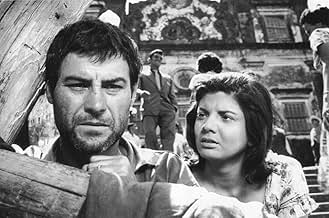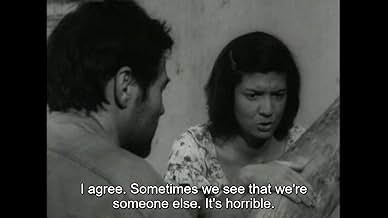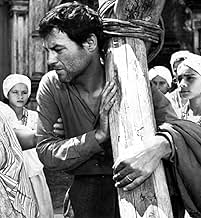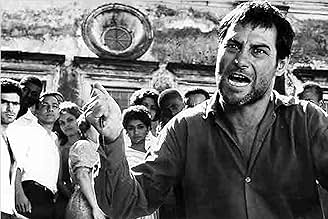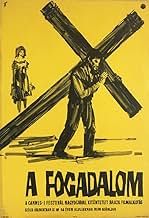IMDb-BEWERTUNG
8,3/10
4341
IHRE BEWERTUNG
Füge eine Handlung in deiner Sprache hinzuA simple yet devout Christian makes a vow to Saint Barbara after she saves his donkey, but everyone he meets seems determined to misunderstand his intentions. Will he be able to keep his pro... Alles lesenA simple yet devout Christian makes a vow to Saint Barbara after she saves his donkey, but everyone he meets seems determined to misunderstand his intentions. Will he be able to keep his promise in the end?A simple yet devout Christian makes a vow to Saint Barbara after she saves his donkey, but everyone he meets seems determined to misunderstand his intentions. Will he be able to keep his promise in the end?
- Für 1 Oscar nominiert
- 4 Gewinne & 1 Nominierung insgesamt
Leonardo Villar
- Zé do Burro
- (as Leonardo Vilar)
Antonio Pitanga
- Coca
- (as Antonio L. Sampaio)
João Di Sordi
- Police Detective
- (as João Desordi)
Veveldo Diniz
- Sacristão
- (as Velvedo Diniz)
Napoleao Lopes Filho
- Bispo
- (as Napoleão L. Filho)
Empfohlene Bewertungen
O Pagador de Promessas / Keeper of Promises (1962) :
Brief Review -
A powerful Brazilian film about a religious circus. The film centers on Zé, a man who is a strong believer in God. When his donkey falls ill, he promises to carry a cross to the Santa Bárbara church in exchange for the donkey's health. As the miracle occurs, the donkey is saved and becomes healthy in just one day. Zé carries a cross on his shoulder for seven leagues and reaches the church alongside his wife, who is reluctant about his beliefs and promises. Just for the sake of a bed, she spends a night with a local pimp, becoming disloyal to her kind-hearted husband. This is the film's biggest flaw, as we later see a crowd gathered outside the church learning about his wife's affair with the pimp, yet Zé does nothing about it. That was quite foolish. Anyway, the father of the church denies Zé's entry because he made his promise in a way that contradicts Catholic beliefs. Zé's simple promise becomes a topic of political, religious, and social hysteria, and he becomes a sensation in no time. While he could make money and become a hero, he denies fame and remains true to his promise. The system does everything to stop him, and the tragic ending shatters you from within. I liked the theme, the way events are explored, and the powerful climax. I just didn't appreciate the wife's character. She was so shameless that she asked her husband to take her home after spending a night with a pimp. One of the hookers humiliates her and her husband in front of a large crowd by calling him a "cuckold," and still, there are no reactions from him regarding her or her mistake. This conflict undermines the purity of the otherwise noble subject, making it appear highly contradictory. Thanks to the powerful message in the climax and the one-man show by Leonardo Villar, this film is a must-watch.
RATING - 7/10*
By - #samthebestest.
A powerful Brazilian film about a religious circus. The film centers on Zé, a man who is a strong believer in God. When his donkey falls ill, he promises to carry a cross to the Santa Bárbara church in exchange for the donkey's health. As the miracle occurs, the donkey is saved and becomes healthy in just one day. Zé carries a cross on his shoulder for seven leagues and reaches the church alongside his wife, who is reluctant about his beliefs and promises. Just for the sake of a bed, she spends a night with a local pimp, becoming disloyal to her kind-hearted husband. This is the film's biggest flaw, as we later see a crowd gathered outside the church learning about his wife's affair with the pimp, yet Zé does nothing about it. That was quite foolish. Anyway, the father of the church denies Zé's entry because he made his promise in a way that contradicts Catholic beliefs. Zé's simple promise becomes a topic of political, religious, and social hysteria, and he becomes a sensation in no time. While he could make money and become a hero, he denies fame and remains true to his promise. The system does everything to stop him, and the tragic ending shatters you from within. I liked the theme, the way events are explored, and the powerful climax. I just didn't appreciate the wife's character. She was so shameless that she asked her husband to take her home after spending a night with a pimp. One of the hookers humiliates her and her husband in front of a large crowd by calling him a "cuckold," and still, there are no reactions from him regarding her or her mistake. This conflict undermines the purity of the otherwise noble subject, making it appear highly contradictory. Thanks to the powerful message in the climax and the one-man show by Leonardo Villar, this film is a must-watch.
RATING - 7/10*
By - #samthebestest.
It is not a surprise that this movie won the golden palm in Cannes. The story of the man that carry a big and heavy cross as a promise for the healing of his donkey is the simpliest and the most beautiful. The poetic way as it is shown became the film an unforgettable classic, with Zé as the protagonist. For sure, technically it is a pre-historic film, the sound quality and editing is really bad, but it even help the audience to focus what really cares. That is not only about poverty, but about humanity. If you liked Central Station, you can't miss.
The only old thing about this movie is its release date. It's very contemporary and universal. O Pagador de Promessas (1962) is based on a play written by Dias Gomes and performed for the first time in 1960.
(About the first scene so not really a spoiler) Zé and his wife, Rosa, left their land, in the country, and went to the city so Zé could pay a promise he made for a saint called Santa Bárbara. He promised to carry a wooden cross all the way to the city and enter Santa Bárbara church with it if his best friend was healed by the saint. (Paying promisses is still common in Brazil ).
I won't say why exactly but the priest doesn't let he enters the church.
It might seem a minor conflict, but it's not and it escalates through the narrative in a chocking way to Zé, Rosa and audience.
Through the obstacles, Gomes criticizes many social institutions and Brazilian society as a whole in a brilliant way, mixing comedy with drama, what was totally brought to light in Anselmo's adaptation.
In this path, the acting is really important and it's fantastic.
Leonardo Villar portrays perfectly Zé certainty and naivety; Glória Menezes thought of everything, from the accent to the way of moving and the confusion Rosa shows; Dionísio Azevedo made a perfect traditional priest and everybody else were great in their respective roles, an awesome cast.
The technical features are amazing, the sets, the costume design, Duarte's shots, Chock Fowle cinematography and Gabriel Migliori scores.
What stands out in the movie is the representation of Brazilian Culture, which is what the film defends, the beautiful mix Brazil is, of European, Indian, African and many other cultures.
(About the first scene so not really a spoiler) Zé and his wife, Rosa, left their land, in the country, and went to the city so Zé could pay a promise he made for a saint called Santa Bárbara. He promised to carry a wooden cross all the way to the city and enter Santa Bárbara church with it if his best friend was healed by the saint. (Paying promisses is still common in Brazil ).
I won't say why exactly but the priest doesn't let he enters the church.
It might seem a minor conflict, but it's not and it escalates through the narrative in a chocking way to Zé, Rosa and audience.
Through the obstacles, Gomes criticizes many social institutions and Brazilian society as a whole in a brilliant way, mixing comedy with drama, what was totally brought to light in Anselmo's adaptation.
In this path, the acting is really important and it's fantastic.
Leonardo Villar portrays perfectly Zé certainty and naivety; Glória Menezes thought of everything, from the accent to the way of moving and the confusion Rosa shows; Dionísio Azevedo made a perfect traditional priest and everybody else were great in their respective roles, an awesome cast.
The technical features are amazing, the sets, the costume design, Duarte's shots, Chock Fowle cinematography and Gabriel Migliori scores.
What stands out in the movie is the representation of Brazilian Culture, which is what the film defends, the beautiful mix Brazil is, of European, Indian, African and many other cultures.
One of those overlooked Films in Cinema History, Honest, multi-layered and amazingly contemporary, this is one of those movies that have admirably stood the test of time, add to that Winning the prestigious Palm d'Or at Cannes 1962.
In my opinion this is one of the best Brazilian movie ever made and also the best movie about religion and its implications to a society in general.
It is a mix of religion, politic, culture, beliefs, prejudices, intolerance. It starts as a simple and innocence gesture from a poor man to pay homage to a Saint after his donkey gets miraculous healed, but instead it becomes a bizarre show of enormous proportions. The authority of the church, the misleading politicians, the media and the crowd use the cause for their own gain. It's a battle between the bureaucracy of norms and the innocence of simple causes. Amazing performances by the main cast.
This movie was awarded with Palme D'Or and the Oscar candidate for Brazil.
THIS IS A MUST SEE MOVIE, it worth every minute of it.
It is a mix of religion, politic, culture, beliefs, prejudices, intolerance. It starts as a simple and innocence gesture from a poor man to pay homage to a Saint after his donkey gets miraculous healed, but instead it becomes a bizarre show of enormous proportions. The authority of the church, the misleading politicians, the media and the crowd use the cause for their own gain. It's a battle between the bureaucracy of norms and the innocence of simple causes. Amazing performances by the main cast.
This movie was awarded with Palme D'Or and the Oscar candidate for Brazil.
THIS IS A MUST SEE MOVIE, it worth every minute of it.
Wusstest du schon
- WissenswertesFirst Brazilian film to be nominated for an Oscar.
- VerbindungenEdited into A Edição do Nordeste (2023)
Top-Auswahl
Melde dich zum Bewerten an und greife auf die Watchlist für personalisierte Empfehlungen zu.
- How long is The Given Word?Powered by Alexa
Details
Box Office
- Weltweiter Bruttoertrag
- 8.229 $
- Laufzeit1 Stunde 38 Minuten
- Farbe
- Sound-Mix
- Seitenverhältnis
- 1.33 : 1
Zu dieser Seite beitragen
Bearbeitung vorschlagen oder fehlenden Inhalt hinzufügen

Oberste Lücke
By what name was Fünfzig Stufen zur Gerechtigkeit (1962) officially released in India in English?
Antwort
